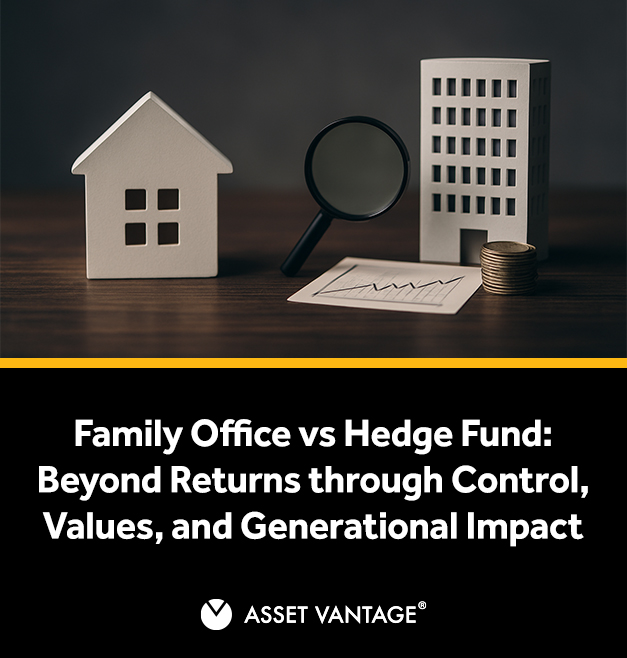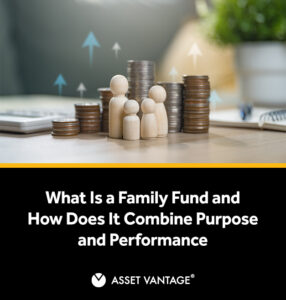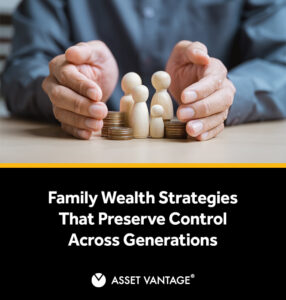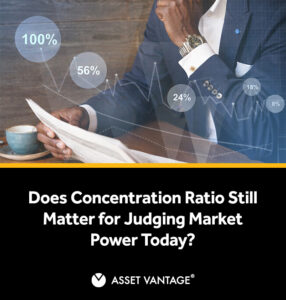Read Time13 Mins
Hedge fund or family office? Explore investment style, regulation, and governance to see which aligns with family wealth goals.
- Family Office vs Hedge Fund: Why This Comparison Matters
- What Is a Hedge Fund?
- Why the Differences Matter for Strategy and Legacy
- Purpose & Values
- Investment Strategy & Horizon
- Risk, Regulation & Performance
- Services & Wealth Management
- Structural Choices
- Family Offices and Hedge Funds: Where They Overlap
- Decision Framework & Future Lens
Family Office vs Hedge Fund: Why This Comparison Matters
A hedge fund generates returns.
A family office governs wealth.
The two serve entirely different purposes.
This choice determines who controls capital, how family values shape decisions, and whether wealth endures for one generation or several.
Families are not deciding which fund to pick.
They are choosing between a governance structure and an investment vehicle that diverge completely in purpose, regulation, and outcome.
The implications extend well beyond performance.
What Is a Family Office?
A family office is a dedicated entity that manages the financial, tax, and governance needs of wealthy families. It can be a single-family office (SFO) serving a single family, or a multi-family office (MFO) serving multiple families.
- Wealth preservation: protect assets across generations.
- Tax and estate planning: ensure efficient transfer of assets and compliance.
- Family governance: establish decision-making protocols, implement succession planning, and address conflict resolution.
- Investment management: deploy capital across private equity, venture capital, real estate, and direct investments.
The office exists to align money with family values. It is less about quarterly performance and more about building continuity.
What Is a Hedge Fund?
A hedge fund is an investment fund that pools capital from ultra-high-net-worth individuals and institutional investors to pursue aggressive, often complex, strategies. Hedge funds are managed by professional hedge fund managers and operate under the oversight of the Securities and Exchange Commission (SEC).
- Aggressive strategies: leverage, derivatives, short-selling, arbitrage
- Focus on returns: measured quarterly, benchmarked against market indices
- Limited scope: investment management only; no governance, tax, or estate support
- High fees and barriers: performance fees (“two-and-twenty”), accredited investor rules
Hedge funds serve investors seeking returns uncorrelated to public markets, but they do not provide the holistic services families need for succession or governance.
Why the Differences Matter for Strategy and Legacy
- Family offices invest to preserve wealth and values across generations
- Hedge funds invest to maximize returns in the near and medium term
- Family offices manage everyday expenses and long-term estate plans
- Hedge funds manage investment portfolios and performance metrics
For families, the risk is mistaking hedge fund access for a complete wealth strategy.
Without a family office framework, tax inefficiencies, governance fractures, and disputes can erode even the best investment gains.
The proper structure determines not only financial outcomes but also whether family wealth endures as capital or dissipates as conflict.
Purpose & Values
Family Offices Focus on Wealth Preservation and Legacy Planning
Family offices exist to align wealth with purpose.
Unlike an investment fund designed only for returns, a family office serves family members directly. Its mission goes beyond managing portfolios. It protects family wealth, reduces tax leakage, and embeds continuity through legacy planning.
Hedge Funds Tend Toward Aggressive Strategies and Short-Term Gains
Family Governance and Values in Investment Decisions
- Family governance: charters, voting rights, and dispute resolution
- Succession planning: transfer of control and knowledge across generations
- Tax and estate planning: structuring assets to minimize conflict and leakage
- Personalized services: from property management to philanthropy
By contrast, hedge funds rarely engage in such matters. Their mandate is limited to generating returns, rather than safeguarding the family’s assets or ensuring that values shape decisions. Family office principals are working closely with family members to craft investment strategies that reflect not only financial goals but also risk appetite and long-term family objectives.
Purpose defines structure. Hedge funds exist to compound capital for individual and institutional investors. Family offices exist to sustain wealth, values, and governance for wealthy families across generations.
Investment Strategy & Horizon
Investment Strategy: Long-Term vs Short-Term Objectives
Family offices focus on preserving family wealth across generations, while hedge funds are built to maximize returns for individual and institutional investors. Family offices develop customized investing strategies by diversifying across multiple asset classes and adjusting allocations over time to meet evolving family needs.
By contrast, hedge fund managers design strategies for speed and scale. They aim to exploit inefficiencies, generate alpha, and measure investment performance over months or quarters.
How Family Offices Invest Across Private Equity, Venture Capital, and Direct Deals
Over the past decade, many family offices have diversified aggressively, funding technology startups, renewable energy projects, and even participating in oil and gas booms. The goal is not quarterly returns, but a diversified portfolio that sustains growth while protecting against downside risk.
How Hedge Funds Invest in Public Markets, Derivatives, and Alternative Assets
Hedge funds invest primarily in public markets and relatively liquid assets. Their toolset includes financial derivatives, leverage, arbitrage, and other alternative investments. Liquidity gives them the agility to exploit market signals, but it also ties their success to short-term performance rather than multi-generational goals.
Investment Horizon: Generational Legacy vs Quarterly Returns
- Family offices manage wealth for 30, 50, or even 100 years. The focus is legacy planning, intergenerational transfers, and alignment of investments with family values. Their mandate is not to exit but to sustain.
- Hedge funds tend to report performance quarterly. They are benchmarked against indices, not family goals. And according to a 2020 report by Goldman Sachs, the average hedge fund lasts only six to seven years. Few survive long enough to serve multiple generations.
For wealthy families, this horizon is decisive. Without a structure that embeds succession, governance, and long-term capital allocation, even strong market gains can dissolve into disputes or inefficiencies.
Risk, Regulation & Performance
Risk Appetite: Preservation vs Aggression
Securities and Exchange Commission Oversight of Hedge Funds
Fewer Disclosure Requirements vs Family Office Transparency
Investment Performance: Measuring Returns and Volatility
Services & Wealth Management
Tax and Estate Planning in Family Offices
Wealth Management Tools: Private Banks, Advisors, and Asset Managers
Family offices build a full ecosystem of wealth management tools:
- Private banks for custody and liquidity
- Financial advisors for planning, education, and monitoring
- Investment managers for specialized mandates
- Independent reporting platforms to consolidate data across investment portfolios
Everyday Expenses vs Generational Legacy Planning
Structural Choices
Personalized Services vs Institutionalized Strategies
- Family offices are built to provide personalized services. A single-family office might tailor reporting, philanthropy, and governance for one lineage, while a multi-family office spreads resources across several families but still adapts to individual needs. The best offices provide personalized services centered around estate planning, education, and succession. Their flexibility is why many family offices act less like institutions and more like partners.
- Hedge funds, by contrast, are designed as institutionalized strategies. They offer scale, liquidity, and standardized mandates but little room for customization. Hedge fund managers must serve all limited partners equally. Families may gain access to sophisticated strategies, yet they lose the control that defines a family office.
This structural contrast is decisive. Many family offices evolve toward hybrid models, blending direct investments with institutional partnerships. Hedge funds remain important for diversification, but family offices and hedge funds serve different ends.
Family Offices and Hedge Funds: Where They Overlap
Shared features include:
- Capital deployment: both structures run complex investment strategies, often spanning alternative investments, private equity firms, and public markets
- Tools and reporting: both use technology platforms, independent custodians, and risk controls to track investment performance and exposures
- Talent flow: professionals move between structures, bringing hedge fund sophistication into family office governance and operations
A growing area of overlap is migration. Hedge fund managers increasingly convert their hedge fund vehicles into single-family offices after returning capital to outside shareholders.
The reason is clear:
- High compliance and operating costs weigh heavily on hedge funds that serve as regulated wealth managers
- A family office structure allows managers to continue deploying capital with the same expertise, but for the benefit of their own family members
This trend reflects how offices and hedge funds borrow from each other. Hedge funds are adding stronger governance practices, while family offices and hedge funds are adopting institutional-grade reporting.
Overlap shows shared tools and talent, but not shared purpose. Hedge funds transform portfolios through scale. Family offices transform wealth by embedding those strategies into governance, continuity, and legacy.
The table below summarizes the key differences and areas of overlap, giving families a clear view of where the two models diverge and where they converge.
| Dimension | Family Offices | Hedge Funds | Where They Overlap |
|---|---|---|---|
| Purpose | Preserve capital, embed governance, sustain legacy for family members | Maximize returns, benchmarked quarterly | Both seek to compound capital |
| Clients | Wealthy families, heirs, and trusts | High-net-worth investors and institutional investors | Both serve sophisticated investors |
| Services | Tax and estate planning, succession, philanthropy, property management, personalized services | Asset management and strategy execution | Both offer reporting and risk analytics |
| Strategy | Family offices typically invest in private equity, venture capital, direct investments, and private corporations | Hedge funds invest in public markets, financial derivatives, leverage, and other alternative investments | Both pursue diversification and scale |
| Horizon | 30–100 years; continuity tied to family investment horizon and legacy | Average lifespan 6–7 years (Goldman Sachs, 2020); quarterly performance cycles | Both adapt allocations to changing markets |
| Governance | Formal family governance structures, values, and succession drive decisions | Limited partner agreements; regulatory oversight by the Securities and Exchange Commission | Both require disciplined investment policies |
| Talent Flow | Offices hire ex-fund professionals for strategy and governance | Hedge fund managers often migrate to single or multi-family offices after returning capital | Shared expertise and practices |
Decision Framework & Future Lens
The choice between a family office a hedge fund is not about which produces higher returns in a single year. It is about structure, purpose, and investment horizon.
- Family offices focus on multi-decade continuity, embedding governance, tax and estate planning, and legacy planning into every allocation
- Hedge funds tend to optimize quarterly results, measured against benchmarks rather than family objectives
Families considering allocations or structure should ask:
- What is our true risk appetite: preservation or growth at all costs?
- Do we need personalized services like property management and succession support, or only access to sophisticated strategies?
- How much transparency do we require in investment performance and reporting?
- Are we better served by external asset management or by building a system where family offices manage governance and capital in-house?
- Which investment strategy aligns with our goals: liquidity-driven or legacy-driven?
The lines between family offices and hedge funds are blurring in practice, as hedge fund managers, strategies, and reporting tools increasingly migrate across both models. Hedge funds transform portfolios through scale and leverage, while family offices are scaling globally to compete on access and sophistication. Some of the world’s family offices already rival mid-sized hedge funds in assets and influence.
- Technology adoption: independent platforms and wealth management tools are closing reporting gaps
- Direct access: family offices invest in alternative investments and private markets, once dominated by hedge funds
- Migration of talent: more hedge fund managers are establishing multi-family offices to manage personal and generational wealth
Hedge funds may dominate quarterly performance, but family offices are built for permanence. The model that wins the next decade will be the one that balances returns with governance, transparency, and purpose.
- Family Office vs Hedge Fund: Why This Comparison Matters
- What Is a Hedge Fund?
- Why the Differences Matter for Strategy and Legacy
- Purpose & Values
- Investment Strategy & Horizon
- Risk, Regulation & Performance
- Services & Wealth Management
- Structural Choices
- Family Offices and Hedge Funds: Where They Overlap
- Decision Framework & Future Lens







